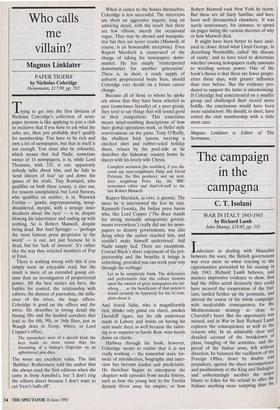Who calls me villain?
Magnus Linklater
PAPER TIGERS by Nicholas Coleridge Heinemann, £17.99, pp. 592 Trying to get into the first division of Nicholas Coleridge's collection of news- paper tycoons is like applying to join a club so exclusive that if you have to ask what the rules are, then you probably don't qualify for membership. You have to be rich and own a lot of newspapers, but that in itself is not enough. You must also be colourful, which means that Asil Nadir, sometime owner of 14 newspapers, is in, while Lord Thomson, with 235, is out; apparently nobody talks about him, and he fails to `send shivers of fear' up and down the spines of his rivals. Tiny Rowland, who qualifies on both these counts, is also out, for reasons unexplained, but Lord Stevens, who qualifies on neither, is in. Warwick Fairfax — 'gawky, unprepossessing, stoop- shouldered, myopic, with a strange inner deadness about the eyes' — is in, despite blowing his inheritance and ending up with nothing. So is Robert Maxwell, despite being dead. But Axel Springer — 'perhaps the most famous press proprietor in the world' — is out, not just because he is dead, but for 'lack of interest'. It's rather like the way they selected members of Pop at Eton.
There is nothing wrong with this if you simply want an enjoyable read, but the result is more of an extended gossip col- umn than an investigation of proprietorial power. All the best stories are here, the battles for control, the relationship with editors, the distrust of journalists, the influ- ence of the wives, the huge offices. Coleridge is good on the offices and the wives. He describes in loving detail the hissing lifts and the hushed corridors that lead to the 6th, 9th, or 16th floor, just as Waugh does in Scoop, where, in Lord Copper's office, The typewriters were of a special kind; the keys made no more sound than the drumming of a bishop's fingertips on an upholstered prie-dieu.
The wives are excellent value. The late Bubbles' Rothermere told the author that she always read the first editions when she came in from Annabel's, but 'I don't ring the editors direct because I don't want to cut Vere's balls off'. When it comes to the bosses themselves, Coleridge is less successful. The interviews are short on aggressive inquiry, long on admiring detail, with the result that there are few villains, merely the occasional rogue. They may be shrewd and manipula- tive but they are never crooks (Maxwell, of course, is an honourable exception). Even Rupert Murdoch is exonerated of the charge of taking his newspapers down- market. He has simply 'reinterpreted downmarket for another generation'. There is, in short, a ready supply of unburnt proprietorial boats here, should Coleridge ever decide on a future career change.
Because all of those to whom he spoke are aware that they have been selected as part (sometimes literally) of a peer-group, they tend to say things that will sound good to their competitors. This sometimes means mind-numbing descriptions of how their global operations work, or Hello!-style conversations on the patio. Tony O'Reilly, the ebullient Irish tycoon, wearing a checked shirt and rubber-soled holiday shoes, relaxes by the pool-side as he describes the hideaway country home he shares with his lovely wife Chryss.
Complete seclusion [he confides], if you dis- count my near-neighbours Patsy and David Puttnam, the film producer, and my next- door neighbou,r Peter Jay, the BBC economics• editor and chief-of-staff to the late Robert Maxwell.
Rupert Murdoch, as ever, is gnomic. The more he is interviewed the less he says. Ramnath Goenka, the Indian press baron who, like Lord Copper (`The Beast stands for strong mutually antagonistic govern- ments everywhere') really did use his news- papers to destroy governments, was alas dying when the author reached him, and couldn't make himself understood. Asil Nadir simply lied. There are exceptions. Conrad Black's sheer enjoyment of his pro- prietorship and the benefits it brings is refreshing, provided you can work your way through the verbiage:
Let us be completely frank. The deferences and preferments that this culture bestows upon the owners of great newspapers are sat- isfying .. . as the beneficiary of that system it would certainly be hypocrisy for me to com- plain about it.
And Aveek Sahir, who is magnificently rich, drinks only grand cru claret, smokes Davidoff cigars, has his silk underwear made in Lahore and insists on having his suits made there as well because the tailor- ing is so superior to Savile Row, wins hands down on charm.
Halfway through his book, however, Coleridge seems to realise that it is not really working — the somewhat static for- mula of introduction, biography and inter- view has become leaden and predictable. He therefore begins to intersperse the chapters with episodes from media history, such as how the young heir to the Fairfax dynasty threw away his empire, or how Robert Maxwell took New York by storm. But these are all fairly familiar, and have been well documented elsewhere. It was surely unnecessary, for instance, to spend six pages listing the various theories of why or how Maxwell died.
It might have been better to have anal- ysed in closer detail what Lloyd George, in describing Northcliffe, called 'the disease of vanity', and to have tried to determine whether owning newspapers really amounts to wielding serious power. One of the book's theses is that there are fewer propri- etors these days, with greater influence than ever before. But the evidence pro- duced to support the latter is unconvincing. If Coleridge had concentrated on a smaller group and challenged their record more boldly, the conclusions would have been more satisfactory. He should, in short, have vetted the club membership with a little more care.
Magnus Linklater is Editor of The Scotsman.


























































 Previous page
Previous page